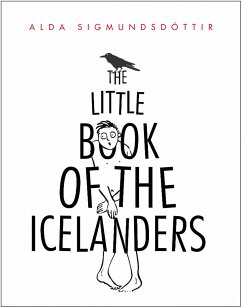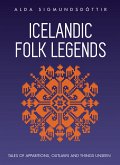This second edition, from 2018, contains new and updated chapters from the original edition, reflecting the changes in Icelandic society and among the Icelandic people since the book was first published in 2012.
Among the fascinating subjects broached in The Little Book of the Icelanders:
. The appalling driving habits of the Icelanders
. Naming conventions and customs
. The Icelanders' profound fear of commitment
. The Icelanders' irreverence
. Why Icelandic women are really men
. How the Icelanders manage to make social interactions really complicated
. The importance of the family in Icelandic society
. Where to go to meet the real Icelanders (and possibly score some free financial advice)
. Rituals associated with the most important life events (weddings, confirmations, graduations, and deaths)
... and many more.
One chapter leads to the next, creating a continuous chain of storytelling. It feels as if you're sitting in the author's kitchen, enjoying a cup of coffee and conversing with her about the quirks of her countrymen, every now and then bursting out laughing. [...] I'm going to heartily recommend The Little Book of the Icelanders, both to fans of Sigmundsdóttir's blog and those unfamiliar with her work. - Iceland Review Online
There aren't many books I'd recommend reading over morning coffee but The Little Book of the Icelanders is one of them. [...] I laughed at the essays in this book, not because I was laughing at Icelanders but because I recognize much of the behavior in myself and members of my family. It felt good. It's not just the sanest, most impressive characteristics that we pass on and share but also some of the zaniest. As I read this book, I frequently thought, yup, I'm definitely part Icelandic. - Lögberg-Heimskringla, Canada
Excerpt
"Even though they live on the edge of the inhabitable world with engulfing darkness for several months of the year, the Icelanders continue to score among the most optimistic people in the world.
Is it the fish? The fresh air? The cod liver oil? Natural selection? The copious amounts of anti-depressants they consume?
Nobody really knows.
However, one thing is sure: this character trait serves Icelanders well and has helped the nation cope with innumerable shocks, from volcanic eruptions to famines, to a massive economic crisis. Whatever happens, you can be sure that the Icelanders will seek the silver lining and soldier on, firmly believing that things will soon get better.
Indeed it is fascinating to observe how the Icelanders deal with trauma at a national level. Their initial reaction always seems to be to bond together. People who on regular days will bicker and quarrel amongst themselves, suddenly become enormously supportive of each other. I've seen this happen in the aftermath of disasters such as snow avalanches and volcanic eruptions, or tragedies that capture the nation's attention.
Take, for example, the economic meltdown of 2008, which for the Icelanders was one of the most catastrophic events in recent history. Many people feared an onslaught of suicides in the wake of all the bankruptcies that ensued. Yet it turned out that the number of suicides actually declined. According to the Directorate of Health, it was because the nation had bonded together, and people were closer and more supportive of each other than they had been in a very long time.
In other words, the optimism is probably a long-term survival strategy. After all, through the centuries of hardship and geographical isolation that the Icelandic nation has endured, defeat was not an option - it was stand together, fight together, or die."
Dieser Download kann aus rechtlichen Gründen nur mit Rechnungsadresse in A, B, BG, CY, CZ, D, DK, EW, E, FIN, F, GR, H, IRL, I, LT, L, LR, M, NL, PL, P, R, S, SLO, SK ausgeliefert werden.









